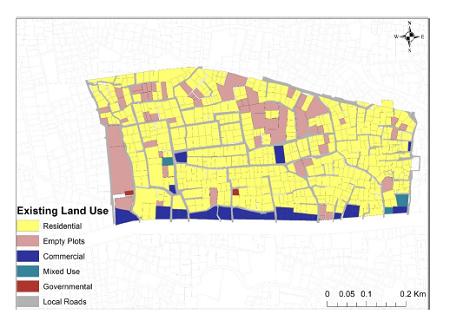


Indian Journal of Science and Technology
DOI: 10.17485/IJST/v15i10.1419
Year: 2022, Volume: 15, Issue: 10, Pages: 408-427
Original Article
Fakhrullah Sarwari1*, Hiroko Ono2, Mohammad Reza Ansari1
1Doctoral student, Civil engineering and Architecture, University of the Ryukyus, Okinawa, Japan
2Professor, Civil engineering and Architecture, University of the Ryukyus, Okinawa, Japan
*Corresponding Author
Email: [email protected]
Received Date:08 August 2021, Accepted Date:13 January 2022, Published Date:10 March 2022
Objectives: Urban upgrading is a widely used method in developing informal settlements. The method has shown a high satisfaction rate among the residents of informal settlements in Kabul city. However, after years the upgraded area still lacks urban facilities. And, only implementation of urban renewal destroyed the existing community. This paper studies a twin-track approach to upgrading and resettlement housing. Resettlement is done using the Urban Renewal method. Urban renewal implementation is compared in three development typologies of the master plan to relocate affected landowners inside the project area. We also carve out urban facilities from empty plots. Methods: The methodology of this research contains five stages; Literature review, data collection, data import, and manipulation, data analysis, and finally, proposing a model for upgrading informal settlements in Kabul city. A case study site of 28 hectares in District 13 of Kabul city is selected to study urban upgrading applicability. Findings: We found through a questionnaire that most residents are willing to accept urban redevelopment projects in the area. However, they prefer to be relocated to the same neighborhood or district. The informal settlements have vast vacant plots; hence we can carve out public facilities. Resettlement housing projects are preferred to be implemented in the mixed-use area typologies of the master plan. As a result of the twin-track approach, public land increases from 15% to 35%. Novelty: Affected landowners are relocated inside the project area by exchanging land for the apartment floor area. The method does not destroy the existing community and avoids gentrification in informal settlements. Hence, this research can help the Afghanistan government and international NGOs upgrade the informal settlement in Kabul city.
Keywords: Informal settlements; Urban Upgrading; Urban Renewal; Twin track approach; District 13; Kabul City
© 2022 Sarwari et al. This is an open-access article distributed under the terms of the Creative Commons Attribution License, which permits unrestricted use, distribution, and reproduction in any medium, provided the original author and source are credited.
Published By Indian Society for Education and Environment (iSee)
Subscribe now for latest articles and news.